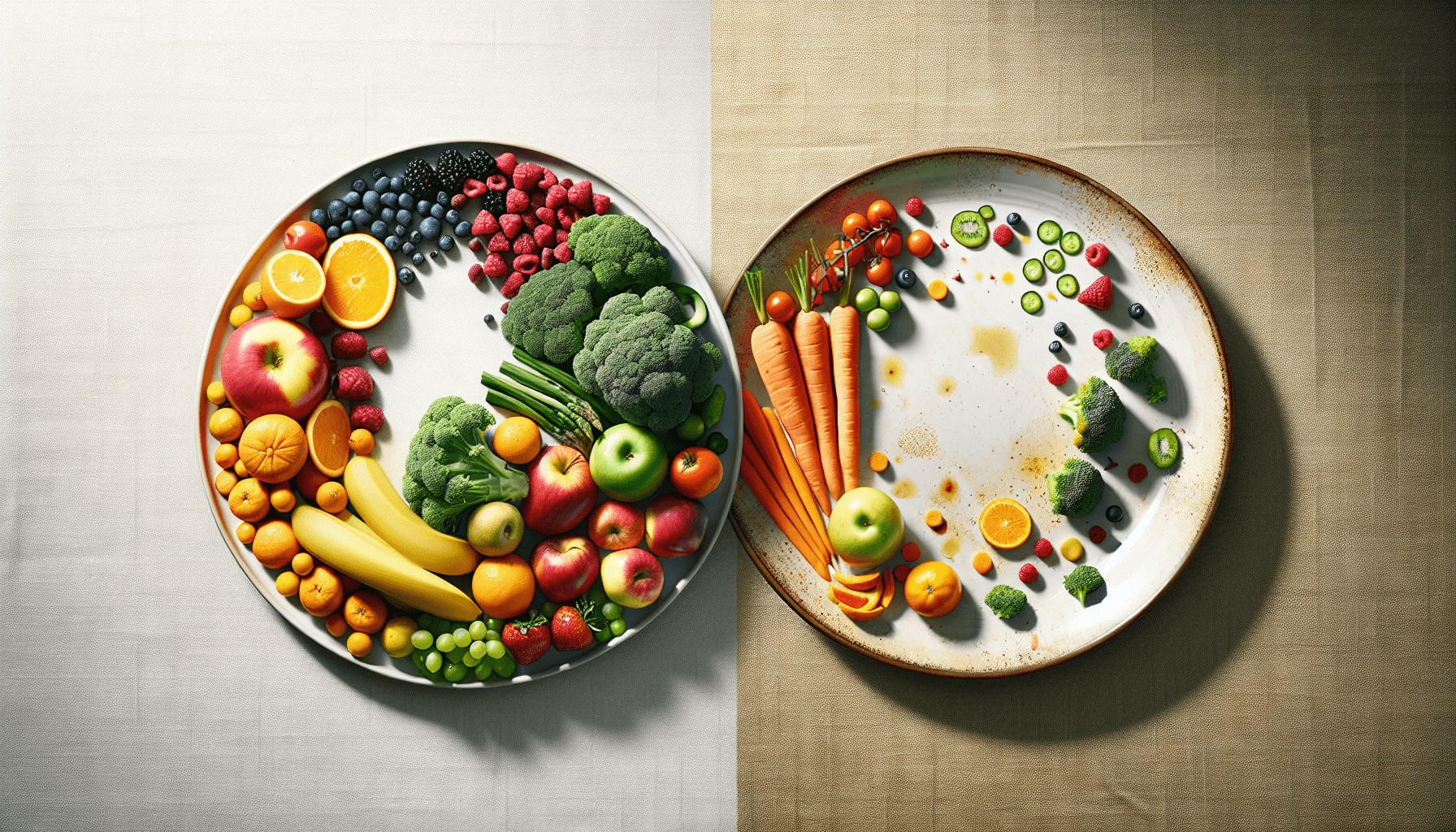Have you ever wished for a flat stomach but dreaded the thought of rigorous exercise? Well, you’re in luck! In this article, you will discover some fantastic tips and tricks on how to achieve a toned and flat stomach without having to hit the gym. From simple dietary changes to adopting healthy lifestyle habits, these easy-to-follow steps will help you achieve the stomach you’ve always dreamed of. So, let’s get started on this journey to a flatter and happier you!
Healthy eating habits
Eat smaller meals
One key aspect of maintaining a healthy lifestyle and achieving a flat stomach is practicing portion control. By eating smaller, more frequent meals throughout the day, you can help regulate your metabolism and avoid overeating. When you consume large meals, your body has to work harder to digest the food, which can lead to bloating and discomfort. By opting for smaller portions, you’ll feel satisfied without feeling overly full or bloated.
Eat slowly
In today’s fast-paced world, it’s easy to rush through meals. However, eating quickly can contribute to bloating and poor digestion. When you eat too fast, you swallow air along with your food, which can lead to bloating and gas. Additionally, when you eat quickly, your body doesn’t have enough time to signal to your brain that you’re full, leading to overeating. By slowing down and chewing your food thoroughly, you not only aid in digestion but also give your brain the chance to register when you’ve had enough to eat.
Avoid processed foods
Processed foods often contain high levels of sodium, artificial additives, and unhealthy fats, which can contribute to bloating and weight gain. These foods are typically low in nutrients and high in calories, making it challenging to maintain a healthy weight and achieve a flat stomach. Instead, opt for whole, unprocessed foods such as fruits, vegetables, lean proteins, and whole grains. These foods provide essential nutrients, fiber, and antioxidants that promote a healthy digestive system and aid in weight management.
Include fiber-rich foods
Fiber is an essential nutrient that plays a crucial role in maintaining a healthy digestive system. It adds bulk to your stools, making them easier to pass, and helps regulate bowel movements. By incorporating fiber-rich foods such as fruits, vegetables, whole grains, legumes, and beans into your diet, you can promote healthy digestion and prevent constipation. Additionally, fiber-rich foods help you feel fuller for longer, reducing the likelihood of overeating and aiding in weight management.
Drink plenty of water
Staying hydrated is vital for overall health and plays a significant role in digestion. Water helps break down food and aids in the absorption of nutrients. Additionally, it prevents constipation by softening stools and promoting regular bowel movements. Drinking an adequate amount of water throughout the day can also help prevent bloating by flushing out excess sodium and toxins from your body. Aim to drink at least eight glasses of water a day, or more if you are physically active or live in a hot climate.
Reducing bloating
Avoid gas-producing foods
Certain foods are known to produce excess gas in the digestive system, leading to bloating and discomfort. To reduce bloating, it’s helpful to avoid or limit foods such as beans, lentils, cruciferous vegetables (broccoli, cabbage, cauliflower), onions, garlic, and carbonated drinks. Pay attention to your body’s individual tolerance to these foods and make adjustments accordingly. Experiment with your diet to identify specific triggers for bloating and try to minimize their consumption.
Limit carbonated drinks
Carbonated drinks, such as soda and sparkling water, can cause bloating due to the carbon dioxide gas they contain. When you consume these beverages, you swallow air along with the liquid, leading to bloating and gas in the digestive system. Limiting or avoiding carbonated drinks can help alleviate bloating and promote a flatter stomach. Instead, opt for still water, herbal teas, or infused water with fruits or herbs for a refreshing and hydrating alternative.
Avoid chewing gum
Chewing gum might seem harmless, but it can contribute to bloating and air swallowing. When you chew gum, you tend to swallow air, which can lead to bloating and gas in the stomach. Additionally, many chewing gums contain artificial sweeteners that can have a laxative effect and contribute to bloating and discomfort. If you find yourself frequently chewing gum, try replacing it with a breath mint or opt for a fresh piece of fruit to satisfy your oral fixation.
Manage stress levels
Stress can have a significant impact on your digestive system, leading to bloating and other digestive discomforts. When you’re stressed, your body releases stress hormones that can slow down digestion and disrupt the natural balance of your gut microbiota. To reduce bloating, it’s essential to manage stress levels through relaxation techniques, regular exercise, and prioritizing self-care activities. Engaging in activities such as yoga, meditation, deep breathing exercises, or spending time in nature can help reduce stress and promote a healthier digestive system.
Avoid constipation
Constipation can contribute to bloating and discomfort in the abdominal area. It occurs when stool moves too slowly through the digestive system, allowing excess water to be absorbed and resulting in hard, dry stools. To prevent constipation, it’s crucial to consume an adequate amount of fiber, drink plenty of water, and stay physically active. Including fiber-rich foods, such as fruits, vegetables, whole grains, legumes, and beans, in your diet can promote regular bowel movements and prevent constipation.
Proper digestion
Chew food thoroughly
Proper digestion begins in the mouth, so it’s important to chew your food thoroughly before swallowing. Chewing breaks down food into smaller particles, making it easier for your stomach and intestines to digest. When you chew food properly, it also allows digestive enzymes in your saliva to begin the breakdown process. By taking the time to chew each bite and savor the flavors, you can enhance digestion, prevent bloating, and allow your body to absorb nutrients more effectively.
Eat in a relaxed environment
Creating a calm and relaxed environment while eating can significantly impact digestion. When you’re stressed or distracted, your body produces stress hormones that can interfere with digestion and lead to bloating. To optimize digestion, find a peaceful space to enjoy your meals, away from distractions such as phones, computers, or the television. Sitting down at a table, taking slow, deliberate bites, and focusing on the taste, texture, and aroma of your food can promote optimal digestion and prevent bloating.
Don’t eat too close to bedtime
Eating a heavy meal too close to bedtime can disrupt digestion and lead to discomfort, including bloating. When you lie down after a large meal, gravity no longer assists in the digestion process, allowing acids and stomach contents to flow backward. This can lead to acid reflux and contribute to bloating. To avoid this, try to finish your last meal or snack at least two to three hours before bedtime. This allows your body ample time to digest and reduces the risk of bloating or digestive discomfort during sleep.
Try natural remedies for indigestion
Certain natural remedies can help alleviate indigestion, including bloating. Peppermint and ginger are two popular herbs that have been traditionally used to aid digestion and soothe stomach discomfort. Peppermint tea can help relax the muscles of the gastrointestinal tract, reducing bloating and cramping. Ginger tea has anti-inflammatory properties and can help alleviate bloating and indigestion. Additionally, chamomile tea and dandelion tea are known for their calming and digestive benefits. Incorporating these herbal teas into your routine may help promote proper digestion and reduce bloating.
Don’t overeat
Overeating is a common cause of bloating and digestive discomfort. Consuming large quantities of food in one sitting puts a strain on your digestive system, as it needs to work harder to break down the excess food. To prevent bloating and promote healthy digestion, practice portion control and be mindful of your body’s hunger and fullness cues. Eating slowly, pausing between bites, and tuning in to your body’s signals can help you avoid overeating and maintain a flatter stomach.
Maintaining a healthy weight
Portion control
Portion control is crucial for maintaining a healthy weight and achieving a flat stomach. Be mindful of your serving sizes and avoid eating beyond what your body needs. Fill your plate with a balance of nutrient-dense foods, such as lean proteins, whole grains, and plenty of fruits and vegetables. By practicing portion control, you can ensure you’re consuming the right amount of calories to support your energy needs while preventing overeating and weight gain.
Keep a food diary
Keeping a food diary can be a helpful tool for maintaining a healthy weight. By recording your daily food intake, you become more aware of your eating patterns, portion sizes, and any potential triggers for bloating or weight gain. It also allows you to track your progress and identify areas where you could make healthier food choices or adjust portion sizes. A food diary can help you stay accountable and make more informed decisions about your eating habits.
Practice mindful eating
Mindful eating involves paying attention to the sensory experience of eating and being fully present in the moment. By practicing mindful eating, you can develop a healthier relationship with food and prevent mindless eating, which often leads to overeating and weight gain. Take the time to savor each bite, appreciate the flavors and textures of your food, and listen to your body’s hunger and fullness cues. By eating mindfully, you can cultivate a more balanced approach to eating and maintain a healthy weight.
Avoid late-night snacking
Late-night snacking can contribute to weight gain and disrupt proper digestion. When you eat close to bedtime, your body doesn’t have enough time to properly digest the food before you go to sleep. This can lead to indigestion, bloating, and weight gain. To maintain a healthy weight and support optimal digestion, try to finish your last meal or snack at least two to three hours before bedtime. If you feel hungry before bed, opt for a light, nutritious snack such as a piece of fruit or a small serving of yogurt.
Avoid crash diets
While it can be tempting to try crash diets for quick weight loss, they are not sustainable or healthy in the long run. Crash diets often involve severely restricting calories or eliminating entire food groups, leading to nutrient deficiencies and metabolic imbalances. They can also cause your body to lose water weight rather than fat, which can result in temporary weight loss that quickly returns. Instead of resorting to extreme diets, focus on adopting a balanced and sustainable approach to your eating habits, incorporating a variety of nutrient-dense foods, and avoiding unnecessary restrictions.

Getting enough sleep
Establish a bedtime routine
Establishing a consistent bedtime routine can help signal to your body that it’s time to wind down and prepare for sleep. Create a relaxing routine that you can follow each night, such as taking a warm bath, reading a book, or practicing relaxation techniques. By incorporating these activities into your nightly routine, you can promote a sense of calm and relaxation, making it easier to fall asleep and achieve a restful night’s sleep.
Create a comfortable sleep environment
The environment in which you sleep can have a significant impact on the quality of your sleep. Make sure your bedroom is cool, quiet, and free from distractions. Invest in a comfortable mattress and pillows that support your body and help align your spine. Additionally, consider using blackout curtains or an eye mask to block out any unwanted light that may interfere with your sleep. By creating a comfortable and soothing sleep environment, you can improve the quality of your sleep and wake up feeling refreshed.
Avoid electronic devices before bed
The blue light emitted by electronic devices, such as smartphones, tablets, and computers, can disrupt your sleep-wake cycle and make it more difficult to fall asleep. The light suppresses the production of melatonin, a hormone that regulates sleep. To promote better sleep, avoid using electronic devices at least one hour before bedtime. Instead, engage in relaxing activities such as reading a book, listening to calming music, or practicing gentle stretching or meditation.
Manage stress and anxiety
Stress and anxiety can significantly impact your ability to fall asleep and stay asleep. To promote better sleep, it’s important to find healthy ways to manage stress and anxiety levels. Engaging in regular exercise, practicing relaxation techniques such as deep breathing or progressive muscle relaxation, and seeking support from professionals or loved ones can all help reduce stress and improve sleep quality. Prioritize self-care activities that help you unwind and relax before bedtime, allowing your body and mind to fully rest.
Stick to a consistent sleep schedule
Maintaining a consistent sleep schedule can help regulate your body’s internal clock and promote better sleep. Try to go to bed and wake up at the same time every day, even on weekends. This helps establish a regular sleep-wake cycle and ensures that your body gets the recommended amount of sleep each night. By sticking to a consistent sleep schedule, you can improve the quality of your sleep, enhance overall well-being, and support weight management efforts.
Reducing stress
Practice relaxation techniques
Relaxation techniques can be an effective way to reduce stress and promote overall well-being. Deep breathing exercises, progressive muscle relaxation, and guided imagery are just a few relaxation techniques that can help calm the mind and relax the body. Incorporating these techniques into your daily routine can help you manage stress, reduce anxiety, and improve your overall quality of life.
Engage in stress-reducing activities
Engaging in activities that bring you joy and help you relax is essential for reducing stress levels. Find activities that help you unwind, such as going for a walk in nature, practicing yoga or tai chi, painting or drawing, or listening to calming music. Engaging in hobbies and activities that you enjoy can help distract your mind from stressors and promote a sense of peace and contentment.
Prioritize self-care
Self-care is crucial for managing stress and maintaining overall well-being. Taking care of yourself both physically and mentally can help reduce stress levels and promote a healthier lifestyle. Make time for activities that bring you joy and relaxation, such as taking a warm bath, getting a massage, practicing mindfulness or meditation, or spending quality time with loved ones. By prioritizing self-care, you can better cope with stress and improve your overall quality of life.
Seek support from friends and family
Having a strong support system is vital for managing stress effectively. Reach out to your friends and family when you’re feeling overwhelmed and share your feelings with them. Talking through your stressors with someone you trust can provide you with a fresh perspective or offer helpful advice. Additionally, spending time with loved ones and engaging in meaningful connections can help reduce stress and foster a sense of belonging and support.
Try meditation or yoga
Meditation and yoga are practices that have been used for centuries to promote relaxation and reduce stress. Both practices involve focusing on the present moment, connecting with your breath, and cultivating a sense of inner calm. Even just a few minutes of meditation or a gentle yoga session can help relieve stress and promote a sense of well-being. Incorporating these practices into your daily routine can have a profound impact on your stress levels and overall mental and emotional health.
Increasing fiber intake
Eat more fruits and vegetables
Fruits and vegetables are excellent sources of dietary fiber and should be a staple in any healthy eating plan. Aim to include a variety of fruits and vegetables in your diet to ensure you’re getting a wide range of nutrients and fiber. Berries, apples, broccoli, carrots, and leafy greens are just a few examples of fiber-rich fruits and vegetables. These foods not only aid in digestion but also provide essential vitamins, minerals, and antioxidants to support overall health and well-being.
Choose whole grains
Whole grains, such as quinoa, brown rice, oats, and whole wheat, are an excellent source of fiber and nutrients. Unlike refined grains, whole grains retain their outer bran layer and germ, which are rich in fiber and antioxidants. By choosing whole grains over refined grains, such as white bread or white rice, you can increase your fiber intake and support proper digestion. Whole grains also provide a slower release of energy, keeping you fuller for longer and aiding in weight management.
Include legumes and beans
Legumes and beans, including chickpeas, lentils, black beans, and kidney beans, are a fantastic source of fiber, protein, and other essential nutrients. Incorporating legumes and beans into your diet can help increase your fiber intake and promote a healthy digestive system. These foods also provide a sustainable source of energy and help regulate blood sugar levels, making them an excellent addition to a balanced and nutritious eating plan.
Add chia seeds or flaxseeds to meals
Chia seeds and flaxseeds are tiny powerhouses of nutrition, packed with fiber, healthy fats, and omega-3 fatty acids. These seeds can be added to smoothies, yogurt, oatmeal, or used as an egg substitute in baking. Including chia seeds or flaxseeds in your meals can help boost your fiber intake and promote a healthy digestive system. These seeds also help keep you fuller for longer, reducing the likelihood of overeating and aiding in weight management.
Consider fiber supplements
If it’s challenging to meet your daily fiber needs through food alone, fiber supplements can be a convenient option. Fiber supplements, such as psyllium husk or glucomannan, are available in various forms, including capsules, powders, or gummies. These supplements can help increase your fiber intake and promote regular bowel movements. However, it’s essential to use fiber supplements as a supplement to a healthy diet rather than a replacement for whole foods.
Drinking herbal teas
Peppermint tea
Peppermint tea is a popular herbal tea known for its digestive benefits. It has been traditionally used to relieve bloating, indigestion, and stomach discomfort. Peppermint contains compounds that help relax the muscles of the gastrointestinal tract, reducing bloating and aiding digestion. Drinking a warm cup of peppermint tea after a meal can help alleviate bloating and promote a flat stomach.
Ginger tea
Ginger tea is another herbal tea with potent digestive properties. It has been used for centuries to soothe the stomach and alleviate various digestive issues, including bloating and indigestion. Ginger contains bioactive compounds that can help relax the gastrointestinal muscles, reduce inflammation, and improve digestion. Sipping on ginger tea throughout the day or after a meal can help prevent bloating and support a healthy digestive system.
Chamomile tea
Chamomile tea is well-known for its calming and soothing properties. It can help relieve stress and anxiety, which can contribute to bloating. Additionally, chamomile tea has anti-inflammatory properties that can help reduce bloating and promote proper digestion. Enjoying a warm cup of chamomile tea before bedtime can help relax your mind and body, ensuring a restful night’s sleep and promoting overall well-being.
Dandelion tea
Dandelion tea is a natural diuretic and has been traditionally used to promote liver detoxification and improve digestion. It can help reduce water retention and alleviate bloating by increasing urine production and eliminating excess fluids from the body. Dandelion tea also stimulates the production of bile, which aids in the digestion of fats. Incorporating dandelion tea into your routine can help reduce bloating and support a healthy digestive system.
Fennel tea
Fennel tea is another herbal tea that has been traditionally used to relieve bloating and support digestion. It contains compounds that have carminative effects, helping to relax the muscles of the gastrointestinal tract and prevent gas formation. Fennel tea can also help soothe digestive discomfort and reduce inflammation in the gastrointestinal system. Enjoying a cup of fennel tea after a meal can help alleviate bloating and promote a flat stomach.

Limiting alcohol consumption
Moderate alcohol intake
Moderation is key when it comes to alcohol consumption. While moderate alcohol intake may have some health benefits, excessive alcohol consumption can lead to various health issues, including weight gain, liver damage, and digestive problems. To maintain a healthy weight and avoid bloating, it’s essential to limit your alcohol intake to moderate levels. Moderate alcohol consumption is defined as up to one drink per day for women and up to two drinks per day for men.
Avoid binge drinking
Binge drinking, defined as consuming a large amount of alcohol within a short period, can have significant negative effects on your health and digestion. Binge drinking can lead to dehydration, electrolyte imbalances, and inflammation of the gastrointestinal tract. It can also disrupt the natural balance of bacteria in your gut, leading to digestive issues such as bloating and discomfort. Avoiding binge drinking and drinking alcohol in moderation can help maintain a healthy weight and support optimal digestion.
Choose lower-calorie alcoholic beverages
Some alcoholic beverages are higher in calories than others, and excessive calorie intake can contribute to weight gain and bloating. To limit calorie intake and reduce the risk of bloating, choose lower-calorie alcoholic beverages. Opt for light beers, dry wines, or spirits mixed with low-calorie mixers. Be mindful of added sugars in mixed drinks or cocktails, as they can contribute to bloating and weight gain. Choosing lower-calorie options can help you indulge in moderation without compromising your health goals.
Stay hydrated while drinking
Alcohol is a diuretic, meaning it can increase urine production and lead to dehydration. Dehydration can intensify bloating and digestive discomfort. To minimize the impact of alcohol on your digestive system and prevent bloating, make sure to drink plenty of water alongside your alcoholic beverages. Alternating between alcoholic drinks and water can help maintain hydration levels, promote optimal digestion, and reduce the likelihood of bloating.
Know your limits
It’s important to know your limits and understand how alcohol affects your body. Each person metabolizes alcohol differently, and factors such as weight, age, and tolerance levels can influence how alcohol affects you. Pay attention to your body’s signals and know when it’s time to stop drinking. By understanding your limits, you can avoid excessive alcohol consumption, reduce the risk of bloating and weight gain, and maintain a healthy lifestyle.
Staying hydrated
Drink plenty of water
Staying hydrated is essential for overall health and well-being, including digestion and weight management. Water helps maintain proper digestion by assisting in the breakdown of food and absorption of nutrients. It also helps prevent constipation by softening stools and promoting regular bowel movements. Aim to drink at least eight glasses of water a day, or more if you are physically active or live in a hot climate. By staying adequately hydrated, you can support a healthy digestive system and prevent bloating.
Consider infused water with fruits or herbs
If you find plain water boring, you can add a twist of flavor by infusing it with fruits or herbs. Infused water is a refreshing and hydrating alternative to sugary drinks while providing added health benefits. Try adding slices of citrus fruits like oranges or lemons, cucumber slices, or herbs such as mint or basil to your water. The natural flavors infuse into the water, creating a delicious and hydrating beverage that can encourage you to drink more water throughout the day.
Limit sugary drinks
Sugary drinks, such as soda, fruit juices, and sweetened beverages, provide empty calories and often contribute to weight gain and bloating. These drinks can also lead to fluctuations in blood sugar levels and promote inflammation in the body. To maintain a healthy weight and prevent bloating, it’s important to limit your consumption of sugary drinks. Opt for water, herbal teas, or naturally flavored drinks instead. If you crave something sweet, try infusing water with fruits or enjoying a piece of fresh fruit.
Choose herbal teas
Herbal teas are a hydrating and flavorful beverage option that can support digestion and promote overall well-being. Many herbal teas, such as peppermint, ginger, chamomile, and dandelion, have digestive properties that can help reduce bloating and support a healthy digestive system. These teas are also calorie-free and packed with antioxidants, making them a great choice for those aiming to maintain a healthy weight. Enjoying herbal teas throughout the day can contribute to proper hydration and help prevent bloating.
Monitor urine color as a hydration indicator
Monitoring the color of your urine is an easy way to assess your hydration levels. Ideally, your urine should be a pale, straw-like color. If your urine is dark yellow or amber, it’s a sign that you may be dehydrated and need to drink more water. On the other hand, if your urine is consistently colorless, it may indicate overhydration. By paying attention to your urine color, you can gauge your hydration levels and adjust your water intake accordingly to ensure optimal digestive health and prevent bloating.
Incorporating healthy eating habits, reducing bloating, promoting proper digestion, maintaining a healthy weight, getting enough sleep, reducing stress, increasing fiber intake, limiting alcohol consumption, and staying hydrated are all essential components of achieving a flat stomach without exercise. By implementing these strategies into your daily routine, you can support your digestive health, improve overall well-being, and work towards your goal of a flatter, healthier stomach. Remember to listen to your body, make conscious food choices, and prioritize self-care to achieve long-lasting results.




